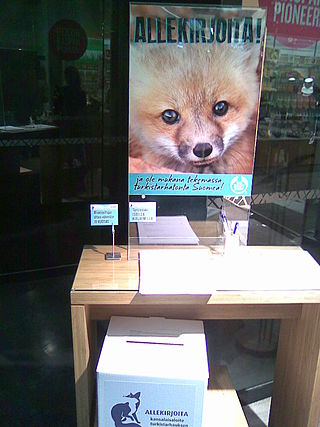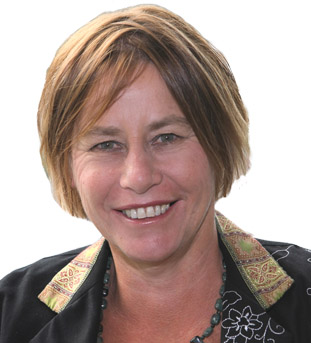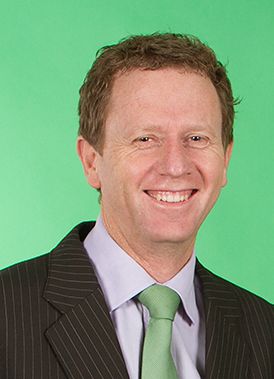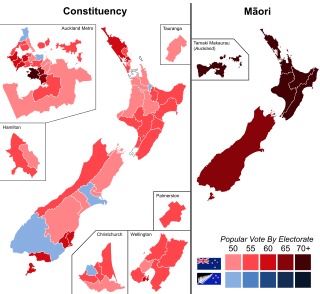
A popular initiative is a form of direct democracy by which a petition meeting certain hurdles can force a legal procedure on a proposition. The hurdles the petition has to meet vary between countries, typically signatures by a certain number of registered voters.
New Zealand First, commonly abbreviated to NZ First or NZF, is a political party in New Zealand, led by and identified with veteran politician Winston Peters. The party has formed coalition governments with both major political parties in New Zealand: with the New Zealand National Party from 1996 to 1998 and 2023 to present, and with the New Zealand Labour Party from 2005 to 2008 and 2017 to 2020. New Zealand First currently serves in a coalition government with both National and ACT as part of the Sixth National government.
In the politics of the United States, the process of initiatives and referendums allow citizens of many U.S. states to place legislation on the ballot for a referendum or popular vote, either enacting new legislation, or voting down existing legislation. Citizens, or an organization, might start an initiative to gather a predetermined number of signatures to qualify the measure for the ballot. The measure is placed on the ballot for the referendum, or actual vote.
The Kiwi Party was a political party operating in New Zealand between 2007 and 2011. Briefly known as Future New Zealand, it was a breakaway from the United Future New Zealand party and sought to carry on the tradition of Future New Zealand. The party was formed when MP Gordon Copeland left United Future after a dispute over support for the Crimes Amendment Act 2007. At the 2008 general election, the Kiwi Party was unsuccessful, and was not re-elected to Parliament. It did not contest the 2011 general election under its own banner, but the leaders and other members stood for the Conservative Party.

Sue Bradford is a New Zealand activist, academic, and former New Zealand politician who served as a list Member of Parliament representing the Green Party from 1999 to 2009.

Russel William Norman is a New Zealand politician and environmentalist. He was a Member of Parliament and co-leader of the Green Party. Norman resigned as an MP in October 2015 to work as Executive Director of Greenpeace Aotearoa New Zealand.
Voting in Switzerland is the process by which Swiss citizens make decisions about governance and elect officials. The history of voting rights in Switzerland mirrors the complexity of the nation itself. The polling stations are opened on Saturdays and Sunday mornings but most people vote by post in advance. At noon on Sunday, voting ends and the results are usually known during the afternoon.

Referendums are held only occasionally by the Government of New Zealand. Referendums may be government-initiated or held in accordance with the Electoral Act 1993 or the Citizens Initiated Referenda Act 1993. Nineteen referendums have been held so far ; fourteen were government-led, and five were indicative citizen initiatives.
Change the NZ Flag was a group campaigning for New Zealanders to change the national flag of New Zealand. The group described itself as "an independent, non-political, design-neutral society that is committed to building support for, and involvement with, the flag change process."

The Crimes Amendment Act 2007 is an amendment to New Zealand's Crimes Act 1961 which removed the legal defence of "reasonable force" for parents prosecuted for assault on their children.

Family First New Zealand is a conservative Christian lobby group in New Zealand. It was founded in March 2006 by former Radio Rhema talkback radio host and South Auckland social-worker Bob McCoskrie who continues to be its National Director. Its 2006 stated objectives were to "seek to influence public policy affecting the rights and protection of families and promote a culture that values the family". In 2009 Victoria University religious studies professor Paul Morris said Family First was "successfully broadening the Christian agenda in New Zealand politics in a way never seen before". In 2020 Family First was described as "New Zealand's most formidable conservative campaigners". Family First was established by a trust deed under the Charitable Trusts Act 1957 in 2006, was registered as a charity in 2007 and deregistered in 2022.

The New Zealand flag debate is a question over whether the national flag should be changed. For several decades, alternative designs have been proposed, with varying degrees of support. There is no consensus among proponents of changing the flag as to which design should replace the current one. Common criticisms of the existing form of the New Zealand flag are its similarity to the Australian flag and the inappropriateness of retaining the Union Jack in the design. A series of polls conducted since the 1970s have shown that a majority of New Zealanders prefer the current flag.

The 2009 New Zealand Referendum on Child Discipline was held from 31 July to 21 August, and was a citizens-initiated referendum on parental corporal punishment. It asked:
Should a smack as part of good parental correction be a criminal offence in New Zealand?

A referendum on Scottish independence from the United Kingdom was held in Scotland on 18 September 2014. The referendum question was, "Should Scotland be an independent country?", which voters answered with "Yes" or "No". The "No" side won with 2,001,926 (55.3%) voting against independence and 1,617,989 (44.7%) voting in favour. The turnout of 84.6% was the highest recorded for an election or referendum in the United Kingdom since the January 1910 general election, which was held before the introduction of universal suffrage.

The 2013 New Zealand local elections were triennial elections to elect local government officials and District Health Board members, and the membership of other local bodies such as Licensing Trusts. All elections were conducted by postal ballot, with election day being Saturday 12 October 2013.

The 1999 New Zealand MP reduction referendum was held during the 1999 general election on 27 November 1999. The Referendum considered two questions, in which one brought upon the question on whether New Zealand Parliament should be restructured - reducing the number of MPs from 120 to 99 members in the House of Representatives.
Opinion polling for the 2014 New Zealand general election has been commissioned throughout the duration of the 50th New Zealand Parliament by various organisations. The five main polling organisations are Fairfax Media, MediaWorks New Zealand, The New Zealand Herald, Roy Morgan Research, and Television New Zealand. The sample size, margin of error and confidence interval of each poll varies by organisation and date.

The Red Peak flag is a proposed New Zealand flag that appeared as one of five options for voters to consider in the 2015–16 flag referendums. Designed by Aaron Dustin in 2015, Red Peak appeared on the government's official longlist of 40 alternative flag designs before failing a final culling of the field on 1 September 2015 to four options. After public disappointment with the official four-flag shortlist, a social media campaign was launched on 2 September that revived the flag's prospects and captured the attention of leading parliamentary figures both in government and opposition. On 23 September, Prime Minister John Key announced the government had agreed to support Green Party legislation that would add Red Peak to the referendum ballot as a fifth option.

Two referendums were held by the New Zealand Government in November/December 2015 and March 2016 to determine the nation's flag. The voting resulted in the retention of the current flag of New Zealand.

The 2023 Berlin climate neutrality referendum, also referred to as Berlin 2030 climate-neutral, was a citizens' initiative launched in Berlin in 2018. It was the subject of a city-wide referendum on 26 March 2023, commonly called the Klima-Volksentscheid. Voters were asked whether the Climate Protection and Energy Transition Act of 2016 should be amended. The primary goal of the referendum was to legislate a goal of carbon neutrality by the year 2030 rather than the existing goal of 2045. Since the referendum proposed specific amendments to the law, its result would have been legally binding. In order to pass, the proposal needed to be approved by a majority of voters and receive approval from a quorum of over 25% of registered voters. While 50.9% of those who participated voted in favour, as turnout was approximately 18%, the 25% quorum was not met.












